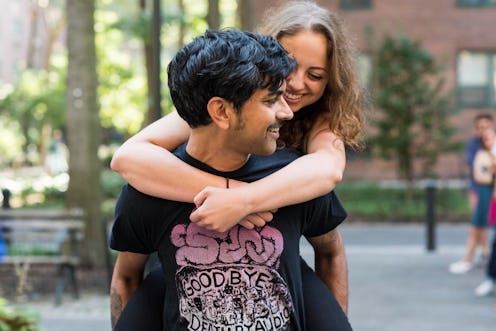Life

Growing close enough to a person that they become one of your best friends requires a certain level of vulnerability. When you open yourself up to someone, you're already walking a fine line between loving them, and falling in love with them. But how do you know if you're truly in love with your best friend? What if you take a calculated risk, but end up ruining your friendship instead? This is a concern I once had myself.
My friendship with Mike began innocently: we were both creatives, struggling to adapt to a community that we felt stifled our innovative voices. We were extremely similar in our way of thinking, finishing both each other's sentences and internal dialogues. When I became aware of my attraction to him, I was conflicted about whether or not to confront him with my feelings: what if I was wrong? Not only had he just ended a long-distance, open relationship, but I was also terrified at the possibility of losing him as a friend.
Questioning your feelings for a best friend is completely OK, according psychotherapist and relationship expert Dr. Gary Brown. "You absolutely have to ask yourself if you want a romantic relationship," Dr. Brown says. "And if you're willing to potentially lose your friendship with them if it doesn’t work out."
If you find yourself wondering, Am I in love with my best friend? in order to be sure of your feelings, ask yourself the following six questions.
1
What Type Of Relationship Would You Have With Them?
Based on your knowledge of your best friend's life, consider the type of relationship they would like to engage in right now. Did they just go through a breakup and need a rebound? Are they dating multiple people and playing the field? Have they mentioned wanting to start something more serious? Consider whether or not their expectations of the future properly match yours. Make these considerations not just for their sake, but for yours. You may think you want to pursue something with them, but ultimately, if their priorities aren't in line with yours, you're both at risk of a letdown.
2
Are You Sure You Don't Just Want Something You Can't Have?
You know what they say: the grass is always greener. Before approaching the subject, make sure that you are truly in love with them, and not in love with the idea of them. Sometimes deeming someone as "off limits" only makes the prospective of the more exciting and desirable — but it's important to put it in perspective. "I don’t think you should necessarily assume that you and your best friend could not be in a romantic relationship," Dr. Brown says. "It isn’t necessarily forbidden." That said, if it feels forbidden, maybe examine whatever it is that's making you feel that way — is it a need for excitement, or is it rooted in something more genuine than that?
3
Is Your Attraction Just Physical, Or Is It Also Emotional?
OK, so maybe you're feeling a sexual spark between you and your best friend, but are you attracted to them on a psychological level as well? Make sure that you aren't acting on a chemical reaction, but instead, feelings on a more intimate, personality-based level. You can examine this by looking at your past relationships, or the last time you felt the same kind of "spark" — did it lead to something lasting when the spark was explored, or was it ultimately only about that attraction? Knowing yourself and your own tendencies can help guide you toward an answer.
4
Do You Trust Them?
With best friendship often comes great responsibility and a lot of history. Are you sure you can trust this person? Have they ever done anything in the past to break your trust or make you question their loyalty? These are important things to consider before taking your relationship one step further, but don't be too hard on your friendship. "Even in the very best of relationships — friendship or romantic — typically nobody can ever really trust anybody with all aspects of their life," Dr. Brown says.
5
How Will This Affect Your Friendship?
Is your friendship with this person strong enough to survive the shock of potential rejection? Ask if sharing this knowledge is something the two of you could recover from, if hypothetically, they do not feel the same way. "If the feelings are mutual, the two of you should absolutely talk about the benefits versus the potential downside in terms of what it would mean to transition into a romantic relationship," Dr. Brown says. That said, if the feelings don't turn out to be mutual, you have to be prepared to accept that — and you also have to be prepared to accept that they might need a little time to process what you told them, too.
6
Above All, Do They Make You Happy?
The most important thing to consider is how your best friend makes you feel on a daily basis. Do they empower you to be your best self? Do they support your most daring decisions? Do they make laugh during moments of self-doubt? "The real issue here is do you both make each other happy," Dr. Brown says. "If that’s the case, and you are romantically compatible." If the answer is yes, and they truly do lead to the happiest you, then you might very well be in love.
I ultimately decided take a leap of faith and tell Mike how I felt. When he revealed that he returned my feelings, I was elated. Although our relationship only lasted a few months, I am so glad I took the opportunity to explore our potential as a couple: because when you love someone, even if you're not 100 percent sure, there's nothing worse than living your life, asking yourself "What if?"
Experts:
Dr. Gary Brown, psychotherapist and relationship expert. http://www.drgarybrowntherapy.com/.
This article was originally published on